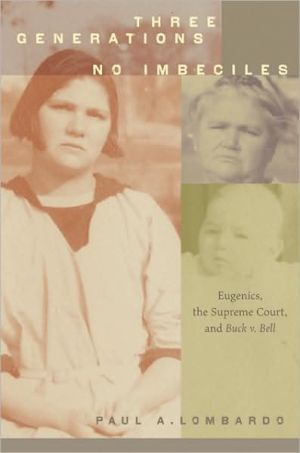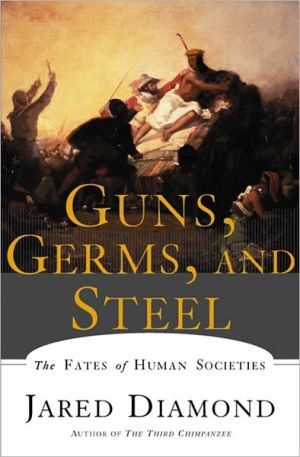Three Generations, No Imbeciles: Eugenics, the Supreme Court, and Buck v. Bell
""Three generations of imbeciles are enough." Few lines from Supreme Court opinions are as memorable as this declaration by Justice Oliver Wendell Holmes Jr. in the landmark 1927 case Buck v. Bell. The ruling allowed states to forcibly sterilize residents in order to prevent "feebleminded and socially inadequate" people from having children. It is the only time the Supreme Court endorsed surgery as a tool of government policy. Paul Lombardo's startling narrative exposes the Buck case's...
Search in google:
"Three generations of imbeciles are enough." Few lines from Supreme Court opinions are as memorable as this declaration by Justice Oliver Wendell Holmes Jr. in the landmark 1927 case Buck v. Bell. The ruling allowed states to forcibly sterilize residents in order to prevent "feebleminded and socially inadequate" people from having children. It is the only time the Supreme Court endorsed surgery as a tool of government policy. Paul Lombardo's startling narrative exposes the Buck case's fraudulent roots.In 1924 Carrie Buck-involuntarily institutionalized by the State of Virginia after she was raped and impregnated-challenged the state's plan to sterilize her. Having already judged her mother and daughter mentally deficient, Virginia wanted to make Buck the first person sterilized under a new law designed to prevent hereditarily "defective" people from reproducing. Lombardo's more than twenty-five years of research and his own interview with Buck before she died demonstrate conclusively that she was destined to lose the case before it had even begun. Neither Carrie Buck nor her mother and daughter were the "imbeciles" condemned in the Holmes opinion. Her lawyer-a founder of the institution where she was held-never challenged Virginia's arguments and called no witnesses on Buck's behalf. And judges who heard her case, from state courts up to the U.S. Supreme Court, sympathized with the eugenics movement. Virginia had Carrie Buck sterilized shortly after the 1927 decision.Though Buck set the stage for more than sixty thousand involuntary sterilizations in the United States and was cited at the Nuremberg trials in defense of Nazi sterilization experiments, it has never been overturned. Three Generations, No Imbeciles tracks the notorious case through its history, revealing that it remains a potent symbol of government control of reproduction and a troubling precedent for the human genome era. Publishers Weekly Law professor and historian Lombardo does a superb job of revealing, for the first time, all the facts in the infamous Buck v. Bell case of the 1920s, the Supreme Court decision ratifying Virginia's compulsory sterilization of "feebleminded" people. In the majority decision, Chief Justice Oliver Wendell Holmes Jr. called the plaintiffs "manifestly unfit" both mentally and morally, and insisted that "three generations of imbeciles are enough." This decision-which has never been overturned-led to tens of thousands of involuntary sterilizations. Lombardo interviewed the last survivor of the three Buck women who were plaintiffs; turned up indisputable evidence that there was no feeblemindedness in that family; unearthed previously unknown correspondence of Carrie Buck's attorney, who, believing the law to be necessary, mounted a deliberately insufficient defense; and documented the private family tragedy (an incestuous rape and resulting pregnancy) that lay behind the Bucks' encounter with doctors bent on exploring eugenics. His book is a testament to injustice and to ignorance-not that of the Buck women, but rather of powerful doctors, attorneys and Supreme Court justices. 17 b&w photos. (Oct.)Copyright © Reed Business Information, a division of Reed Elsevier Inc. All rights reserved.
Prologue: The Expert Witness 11 Problem Families 72 Sex and Surgery 203 The Pedigree Factory 304 Studying Sterilization 425 The Mallory Case 586 Laughlin's Book 787 A Virginia Sterilization Law 918 Choosing Carrie Buck 1039 Carrie Buck versus Dr. Priddy 11210 Defenseless 13611 On Appeal: Buck v. Bell 14912 In the Supreme Court 15713 Reactions and Repercussions 17414 After the Supreme Court 18515 Sterilizing Germans 19916 Skinner v. Oklahoma 21917 Buck, at Nuremberg and After 23618 Rediscovering Buck 250Epilogue: Reconsidering Buck 267Acknowledgments 281App. A The Supreme Court Opinion in Buck v. Bell, by Justice Oliver Wendell Holmes Jr. 285App. B Virginia Eugenical Sterilization Act, 1924 288App. C Laws and Sterilizations by State 293Notes 295A Note on Sources 355Index 357
\ Reviewer: Suzanne M Shultz, MA(York Hospital)\ Description: This book about the Buck v. Bell Supreme Court decision and its lasting implications for eugenic sterilization policies broadly describes the U.S. eugenics movement, its history and prime movers, the creation of a "Model Sterilization Law" in Virginia, and the adoption of numerous state laws permitting sterilization surgery. The events surrounding the Buck v. Bell test case, the players, the testimony, arguments, decisions, appeals, and reactions are carefully considered. The title is drawn from the majority opinion written by Oliver Wendell Holmes Jr. in the 1927 case.\ Purpose: The author points to recent genetic advances, notably the Human Genome Project, as his impetus for writing this book. He notes, "The recent triumphs in genetic science announced alongside revelations and recriminations about eugenics — and happening alongside ongoing challenges to reproductive rights - suggest that we have much to learn about Buck v. Bell. This book is the starting point in our lesson." He adds, "Buck is regularly mentioned in books on law, science, and medical history, but has never been adequately explained in a well-documented book of its own. This book tells that story, a notorious - and still open - chapter in U.S. history."\ Audience: Medical practitioners, students, and historians; scientists; lawyers; legislators; ethicists; public health workers; social workers; behavioral health practitioners; general historians; and the public will appreciate the value of this work. Paul Lombardo, PhD, JD is professor of law at the Georgia State University College of Law and is widely published on eugenics and involuntary sterilization surgery, including the Buck decision. \ Features: "The core of the book is in the middle chapters where creation of the Virginia sterilization law is detailed and the stage is set for the Buck v. Bell test case. Five chapters are devoted to the conduct of the trial, the appeals in Virginia and ultimately the U.S. Supreme Court decision. Two additional chapters summarize the reactions to the decision and the subsequent lives of the people involved. Notably worthwhile is the history of the eugenics movement, the biographical sketches of its leaders, and their research methodologies. Connections between and exchange of research procedures and philosophy with the Nazi regime prior to and during World War II and Germany's implementation of eugenic sterilization on a massive scale comprises a chapter. The use of U.S. eugenic publications and application of its established legal foundations which were employed in defense of activities of Nazi physicians at the Nuremberg trials is disclosed in another chapter. Setting aside for the moment the broader issue of eugenics, the trial of Carrie Buck is portrayed as a miscarriage of justice, the result of the failure of her defense attorney's fiduciary duty. The author builds his case in the clear and unemotional style of the law. His assessment, however, is not without passion. Carrie Buck's attorney did not fail "simply because he was incompetent; Whitehead failed because he intended to fail." Buck v. Bell mocks the right to a fair trial and certainly violates the spirit of fair play. The outcome of the eugenics movement may have been quite different had Virginia's "Model Law" embodied in Carrie Buck failed to receive the judicial stamp of approval thus erasing Holmes's infamous words "Three generations, no imbeciles." "\ Assessment: There is a relative paucity of information about Carrie Buck and the Buck v. Bell trial in both book and journal literature and certainly none that provides as much detail as this one does. For this analysis alone, this book is highly recommended. The eugenics material is a bonus.\ \ \ \ \ Reviewer:Suzanne M Shultz, MA(York Hospital)\ Description:This book about the Buck v. Bell Supreme Court decision and its lasting implications for eugenic sterilization policies broadly describes the U.S. eugenics movement, its history and prime movers, the creation of a "Model Sterilization Law" in Virginia, and the adoption of numerous state laws permitting sterilization surgery. The events surrounding the Buck v. Bell test case, the players, the testimony, arguments, decisions, appeals, and reactions are carefully considered. The title is drawn from the majority opinion written by Oliver Wendell Holmes Jr. in the 1927 case.\ Purpose:The author points to recent genetic advances, notably the Human Genome Project, as his impetus for writing this book. He notes, "The recent triumphs in genetic science announced alongside revelations and recriminations about eugenics -- and happening alongside ongoing challenges to reproductive rights - suggest that we have much to learn about Buck v. Bell. This book is the starting point in our lesson." He adds, "Buck is regularly mentioned in books on law, science, and medical history, but has never been adequately explained in a well-documented book of its own. This book tells that story, a notorious - and still open - chapter in U.S. history.\ Audience:Medical practitioners, students, and historians; scientists; lawyers; legislators; ethicists; public health workers; social workers; behavioral health practitioners; general historians; and the public will appreciate the value of this work. Paul Lombardo, PhD, JD is professor of law at the Georgia State University College of Law and is widely published on eugenics and involuntary sterilization surgery, including the Buck decision. \ Features:The core of the book is in the middle chapters where creation of the Virginia sterilization law is detailed and the stage is set for the Buck v. Bell test case. Five chapters are devoted to the conduct of the trial, the appeals in Virginia and ultimately the U.S. Supreme Court decision. Two additional chapters summarize the reactions to the decision and the subsequent lives of the people involved. Notably worthwhile is the history of the eugenics movement, the biographical sketches of its leaders, and their research methodologies. Connections between and exchange of research procedures and philosophy with the Nazi regime prior to and during World War II and Germany's implementation of eugenic sterilization on a massive scale comprises a chapter. The use of U.S. eugenic publications and application of its established legal foundations which were employed in defense of activities of Nazi physicians at the Nuremberg trials is disclosed in another chapter. Setting aside for the moment the broader issue of eugenics, the trial of Carrie Buck is portrayed as a miscarriage of justice, the result of the failure of her defense attorney's fiduciary duty. The author builds his case in the clear and unemotional style of the law. His assessment, however, is not without passion. Carrie Buck's attorney did not fail "simply because he was incompetent; Whitehead failed because he intended to fail." Buck v. Bell mocks the right to a fair trial and certainly violates the spirit of fair play. The outcome of the eugenics movement may have been quite different had Virginia's "Model Law" embodied in Carrie Buck failed to receive the judicial stamp of approval thus erasing Holmes's infamous words "Three generations, no imbeciles." \ Assessment:There is a relative paucity of information about Carrie Buck and the Buck v. Bell trial in both book and journal literature and certainly none that provides as much detail as this one does. For this analysis alone, this book is highly recommended. The eugenics material is a bonus.\ \ \ Publishers WeeklyLaw professor and historian Lombardo does a superb job of revealing, for the first time, all the facts in the infamous Buck v. Bell case of the 1920s, the Supreme Court decision ratifying Virginia's compulsory sterilization of "feebleminded" people. In the majority decision, Chief Justice Oliver Wendell Holmes Jr. called the plaintiffs "manifestly unfit" both mentally and morally, and insisted that "three generations of imbeciles are enough." This decision-which has never been overturned-led to tens of thousands of involuntary sterilizations. Lombardo interviewed the last survivor of the three Buck women who were plaintiffs; turned up indisputable evidence that there was no feeblemindedness in that family; unearthed previously unknown correspondence of Carrie Buck's attorney, who, believing the law to be necessary, mounted a deliberately insufficient defense; and documented the private family tragedy (an incestuous rape and resulting pregnancy) that lay behind the Bucks' encounter with doctors bent on exploring eugenics. His book is a testament to injustice and to ignorance-not that of the Buck women, but rather of powerful doctors, attorneys and Supreme Court justices. 17 b&w photos. (Oct.)\ Copyright © Reed Business Information, a division of Reed Elsevier Inc. All rights reserved.\ \ \ \ \ Library JournalLombardo (law, Georgia State Univ.) traces a seminal 1927 Supreme Court case arising from the attempt by authorities in Virginia to force the sterilization of a woman believed to be mentally and socially "insufficient." Lombardo carefully re-creates the trial, which resulted in a ruling formally endorsing the sterilization of Carrie Buck. The case quickly advanced to the U.S. Supreme Court, where the justices ruled that the sterilization law did not violate the Eighth Amendment. Lombardo minces no words in expressing his disdain for the lackluster performance and conflicts of interest of Buck's attorney. Carrie's fate before the Court, argues the author, was partially attributable to social Darwinism as well as the attitude of the Court's chief social arbiter, Oliver Wendell Holmes Jr., that society should not bear the burden of people born without pedigree, status, intelligence, or capacity. Lombardo observes that by the early 1970s medical science had strongly discredited the notion that bad heredity could be interrupted by sterilization, and the entire movement ground to a screeching halt. This original study is highly recommended for academic, public, and law libraries.\ —Philip Y. Blue\ \ \ \ \ \ Psychiatric ServicesMeticulously detailed and researched history... this book is enjoyable, thought provoking, and troubling in equal measure. I highly recommend it.\ — Susan Stefan, J.D.\ \ \ \ \ \ Disability Studies QuarterlyThree Generations provides valuable, new, and timely revelations for students and professional scholars across many disciplines.\ — Susan Burch\ \ \ \ \ \ CommonwealMeticulously researched... As Lombardo conclusively demonstrates, those who sought to have Buck sterilized did not let the facts get in the way of the story the law required them to tell.\ — Paul Lauritzen\ \ \ \ \ \ Harvard Law ReviewCompelling and well-researched... Three Generations, No Imbeciles gives Carrie Buck's long-untold story the attention it deserves.\ \ \ \ \ PsycCRITIQUESThis book is a legal and historical masterpiece, combining meticulous ethical analysis with a liveliness that belies its scholarly roots and exhaustive footnotes and research.\ — Michael B. Blank\ \ \ \ \ \ Virginia LawyerIn a very readable 279 pages, Paul A. Lombardo sets forth the facts about the eugenics movement in the United Sates.\ — Robert T. Adams\ \ \ \ \ \ Journal of the History of Medicine and Allied SciencesHeartbreaking and riveting... There is likely to be no better account of Buck v. Bell than Lombardo's book.\ — Ian Dowbiggin, Ph.D.\ \ \ \ \ \ American Journal of BioethicsThe struggle for justice goes on. Bioethicists typically ask 'ought' questions, but not all follow up with activism. More bioethicists should accept the social activist role. Paul Lombardo demonstrates exactly how it can be done.\ — Ruth Levy Guyer\ \ \ \ \ \ USA TodayFor almost 30 years, Lombardo has tried to uncover the full story of the wrongs.\ — Andrea Pitzer\ \ \ \ \ \ Quarterly Review of BiologyWhat makes Lombardo's analysis so important is that issues about the fate of our mutant genes, about the use of technologies to monitor pregnancies at risk for birth defects, and alternatives to relying on chance alone are subverted by our fear of eugenics.\ — Elof Axel Carlson\ \ \ \ \ \ ChoiceOverall, a fascinating book on one of the darker decisions in US law. An excellent addition to collections on US constitutional law, history, and reproductive rights.\ \ \ \ \ Internet Review of BooksLombardo tells a compelling and heavily documented story of injustice to society’s less fortunate citizens. His sympathy for the abused is evident, but that does not turn Three Generations, No Imbeciles into a polemic... Armed with knowledge from this excellent book, we can hope we never return to the mistakes of our past.\ \ \ \ \ New England Journal of MedicineThe book is lucidly written, well researched, thorough, and provocative... Three Generations, No Imbeciles is a must read for anyone who wants to understand the historical context of Buck v. Bell and its implications for ethics, law and public policy.\ \ \ \ \ BooklistAn engrossing look at a shameful case.\ \ \ \ \ PathophiliaLombardo reminds us that the same incentives to improve public health and lower tax burdens exist today.\ \ \ \ \ History News NetworkA sad and fascinating book... With his legal and historical background, Lombardo is particularly suited to give us a book that explains a surprisingly ignored injustice, its antecedents and consequences, and helps us to think about the ongoing struggle to find a health balance between privacy and government power.\ — Stephen Murdoch\ \ \ \ \ \ ReasonStartling.\ — Damon W. Root\ \ \ \ \ \ Journal of Legal EducationAs a historical endeavor, it is rich and rewarding, permitting the reader a broad understanding of the social, cultural and legal context for the case that inspired Oliver Wendell Holmes' famous quotation, 'Three generations of imbeciles are enough.'... Equally important as the excavation of this history is the manner in which Lombardo's writing surfaces the emotional consequences of fertility-related policies.\ — Michelle Oberman\ \ \ \ \ \ Law & Society ReviewLombardo does an excellent job of meticulously laying out the sham nature of Buck v. Bell, and by the end of the text, the reader is left with no doubt that the case, which has never been overturned, was mired in deceit... Fascinating nuggets of racial politics, class inequality, and fear of the female body.\ \ \ \ \ Magill Book ReviewsA powerful commentary on the dangers of politicized medicine and social engineering.\ — Daniel P. Murphy\ \ \ \ \ \ Virginia Magazine of History and BiographyA remarkable work of investigation and narrative synthesis, Lombardo connects Buck v. Bell to a broader debate over the place of eugenics in American life and law... Having amassed over two decades of research, including interviewing Carrie Buck, Lombardo is uniquely qualified to tell this story.\ — Jason Morgan Ward\ \ \ \ \ \ American Historical ReviewThis painstakingly researched book will surely be the definitive study of Buck v. Bell for many years to come.\ — Diane B. Paul\ \ \ \ \ \ IsisThree Generations, No Imbeciles chronicles Buck's tragic life and reviews the larger history of American eugenics in a moving narrative that will appeal to a broad audience of lay readers interested in controversies over reproductive rights, public health, science, and the law.\ — Brent Ruswick\ \ \ \ \ \ Nursing History ReviewLombardo convincingly shows that the eugenics of the 1920s, despite professional reversals and government apologies, still echoes in discussions of designer babies, grumbling about the costs of social programs and attempts to calculate the financial value of life.\ — Edward Slavishak, PhD\ \ \ \ \ \ Criminal Law Library BlogHighly recommended for academic, public, and law libraries.\ — Philip Y. Blue\ \ \ \ \ \ MetapsychologyThis book is suitable for any audience interested in the history of the eugenics movement in the United States.\ — Susan L. Smith, Ph.D.\ \ \ \ \ \ Comptes Rendus BiologiesCompelling.. brilliant... and refreshing.\ — Jana Grekul\ \ \








